- Home
- Donald Hamilton
Assassins Have Starry Eyes Page 19
Assassins Have Starry Eyes Read online
Page 19
“What?”
“Do you remember the girl who came to the hospital to shoot me some months ago? Nina Rasmussen?”
“I’d hardly forget her. Even if this place wasn’t as full of gossip as an old ladies’ home.” Natalie smiled. “I know all about your little interlude in the woods, darling. What about Nina Rasmussen?”
“She’s got a lot more stuff than most of these jerks; the ones I’ve met, at least. If I see a break coming, I’ve got to know that she’s being taken care of. I’m leaving her to you. You took care of her once with a pitcher of flowers. There aren’t any flowers around, but there are plenty of rocks. If things start to happen take her out of action even if you have to beat her brains out. Just watch yourself; she’s got a gun.”
Natalie hesitated, studying my face. “I thought—”
“What?”
“From what they said, I understood that you liked her.”
“What the hell,” I said, “has that got to do with it? I’ve got one wife; what do you want me to do, start a harem? There are times when you’ve got to stop loving the whole of humanity and concentrate on one or two specimens. Right now I’m working on getting you and me out of here, Princess. Nina Rasmussen may be a wonderful kid, but if she gets in the way, clobber her.”
Natalie studied me for a moment longer; then there was a rattling sound at the door as somebody fitted a key into the lock, and she stepped forward quickly and kissed me hard on the mouth. “All right, darling,” she breathed. “I’ll clobber her.”
I did not know any of the people who came in. They were really very considerate; first they took us to the washrooms and let us clean up, and then they escorted us into a small mess hall and fed us a breakfast that had the tastelessness of any kind of institutional food. There was only one cup of coffee because of the water rationing. As we were getting up, Nina came into the place. She needed combing and dusting-off; and somehow her tousled appearance did not seem quite as attractive to me as it once had. There’s nothing like a good, passionate family reunion to enable you to regard other women with cold objectivity. The endocrinologists probably have an explanation for this phenomenon. Nevertheless, with her boyish stride, and the gun in her waistband and color in her cheeks, she made an interesting contrast to all the dreary, listless, underground faces we had seen.
“I’ll take them to the Director,” she said, and our escort melted away. Nina looked at me and smiled, and took the gun from her belt. She pulled out the clip and pocketed it, and drew back the slide to show me the chamber empty. “Just so you won’t be tempted to grab for it and make a break, now that you have your wife back, Dr. Gregory,” she said. “Big and brave as you are, I doubt that you could fight your way out of this place bare-handed… Come on. They’re waiting for you.”
We walked down the hall together, and stopped at the last door, where we had paused the evening before. I felt Natalie take my arm and hold it tight. Nina knocked, received an answer, opened, and stepped back to let me pass. There were about a dozen people crowded into the small chamber we entered. I recognized Louis Justin and the woman Nina had identified as Minna Goldman, the micro-biologist. Some of the other people looked vaguely familiar. The man behind the desk looked like a white-bearded prophet in overalls; for some reason I was reminded of John Brown of Kansas although the old abolitionist’s hair and beard, in the painting I’m thinking of, are not white.
Nina said, “Here they are, Dr. Fischer.”
I looked at the presiding figure again, watched him take off the rimless glasses he was wearing and polish them and replace them in a gesture that was out of keeping with the fierceness of his appearance—a gesture that was also very familiar. I had lived with that gesture for several months once, in Washington. Old Fischer always polished his glasses before tackling any new problem.
I said, “Long time no see, Paul. I should have known you were too stubborn to fall off a boat.”
He looked at me steadily for a long moment. His eyes had developed a kind of blue impenetrability since I had last seen him; they seemed to be focused on nothing—or everything. You could not help wondering how the man could see out of them, when you could not see into them at all.
“Sit down,” he said curtly, and we sat down on two of the folding chairs placed before the desk. Natalie arranged the blue jacket neatly across her knees. I noticed that Nina had not come into the room with us. The door was closed and Fischer looked over our heads at the others, seated and standing.
He began to speak abruptly. “There have been some protests against the policies of the governing councils since I took office eight months ago. It seems that certain members of our organization feel that we are pursuing too aggressive a course; that it is our duty to wait passively for annihilation without raising a hand against those who, usurping the powers that are God’s alone, would turn them loose to destroy all mankind. To make the issue clear, I’ve had such a man brought here. Some of us have worked with him; I myself have remonstrated with him, to no avail. I don’t say he is evil and deserves to die; such judgments belong to God. I merely say that if he continues to live he will continue to put thousands—perhaps millions—of other lives in danger. I can’t see that we have any choice but to remove him. The woman, having once been one of us, and having deliberately chosen to transfer her loyalty to this man, deserves no consideration.”
He stopped talking. After a while there was a stir behind us, and Louis Justin’s voice asked, “You mean we should kill them? But that’s murder!”
A woman’s voice said, “I did not leave my home and work to become a member of a gang of assassins!”
Fischer smiled and spread his hands. “Very well then. If that’s the consensus of the group, I suggest that you give these two people some provisions and show them the way out of here—unless you think we should radio the plane and send them back to civilization in style. They can tell their story to the police faster that way.”
There was a moment of silence; then Justin’s voice said angrily, “It seems to me, Dr. Fischer, that you could have asked for our opinion before you brought them here and put us all at their mercy!”
“That’s just the point,” Fischer said calmly. “I had Dr. Gregory brought here, regardless of what he might learn about this place, for the simple reason that we are all at his mercy anyway, or soon will be if he is allowed to continue with his work. You have all read Dr. Bates’s last report concerning the recent disastrous government test in Nevada, but even though some of you were involved in the research leading up to it, as I was, you don’t seem to have caught the full significance of it. That test, ladies and gentlemen, presages a weapon that will make this place as obsolete as the weapon tested at Bikini made our first refuge. And even if it does not live up to its evil promise, it’s only a matter of time before some other weapon does. If these men who put themselves above God and humanity are allowed to continue their reckless probing into the forbidden secrets of the universe, our best efforts at finding sanctuary are bound to meet defeat. Our choice is plain: either we give up our purpose altogether, or we strike back before it is too late.”
Nobody spoke. After a while, Fisher went on: “You’ll want to know a few practical matters, how we can dispose of these people in such a way as to divert attention from this place. Dr. Gregory is known to have been looking for a mine called Ararat Three; he will be shown to have found such a mine—we have located a suitable old digging in the desolate country to the north, and preliminary work has been done to make it look convincing as a hide-out. There’s already some doubt about Dr. Gregory’s loyalty; he has been suspended from his government position. We are prepared to leave clues to indicate that he joined his wife at the false Ararat Three and fled with her out of the country, the escape financed by money obtained from his father-in-law on the strength of a forged kidnap note, money which he is carrying in his coat at this moment. Of course, this plan entails insuring the complete disappearance and permanent silence of the couple, but t
here are many old mine shafts on the desert, and I won’t bother your consciences with the actual details. All I want, since this is a democratic organization, is your assent to this step.” He paused, and threw out his arm dramatically. “Don’t look at me. There’s your problem! Either let them walk out of here with what they know, and give up all our hopes and plans, or kill them! You have no other choice.”
I waited until his arm came down; then I said, “Do I get to say something?”
He hesitated. There was a murmur from the room, and he said quickly, “Of course. If you have anything to say, I’m sure we’ll be interested in hearing it.”
I got up cautiously. In that place I was never quite sure that one of the rafters wasn’t going to catch me an undignified crack on the head. I turned to face the room, and said, “I’ve only got two things to say. First, as Dr. Fischer indicated, this shelter is already on the verge of being obsolete; and whether I get back to finish my work or not doesn’t matter. Somebody’ll take over where I left off. Maybe the world isn’t ready for that particular toy, but it’s here and you’d better learn to live with it.” I looked down at Natalie, whose face was turned up to me, and spoke to her: “As for the right and wrong of what I’m doing, or a thousand other men are doing in a thousand laboratories in this country and others—all I’ll say is this: nobody’s ever managed to turn the clock back yet. They haven’t even managed to stop it. Do you want to stop it? Would you like our knowledge to stay in this incomplete and half-digested state forever? So far there are still people who think they can arrange a war in such a way as to destroy a lot of other people but not themselves. Whether they are right or wrong doesn’t matter; what matters is that they may try. Should we leave it at that? Or should we go on to the point, not so far away, where every citizen of every nation will know that when a certain button is pushed, by anybody at all, right or wrong, the world ends; and that therefore they’d damn well better see that it doesn’t get pushed. I’m working on the assumption that the quicker we get to that point, the better; and so are a lot of other men I know. Maybe there’ll still be somebody crazy enough to commit suicide for the whole human race after we’re finished; but in that case there’s no hope for us anyway. I’d rather think that when people know enough, they’ll figure out a way to live in peace, if only because they have to.”
It was probably the longest non-technical speech I had ever made in my life. I’ll never know how it went over, because just as I was sitting down there was a jolting jar that seemed to shake the whole place, and the lights went out. They came on again immediately as some kind of emergency equipment took over from the main generators—you could tell the difference; this current was weak and uneven. In the yellow, flickering light I could see the room filling up with dust shaken from the ceiling. Little rivulets of dirt were trickling down from between the heavy beams. I felt Natalie close by and put an arm around her. Out in the hall somebody shouted:
“Fire! Fire at Gate Two. The north tunnel is on fire!” The room began to empty. I heard Fischer’s voice barking orders. I made my way with Natalie toward the wall and squeezed us in between two of the upright timbers. A man came rushing in and made a report; the fire was gaining, they were running short of water, he needed the key to Number Four Tank. Justin caught him as he was running out with it.
“What started it, man?”
“I don’t know. An explosion of some kind. We haven’t been able to get in far enough to see.”
“Is the north entrance open?”
“Can’t tell. She’s burning pretty damn hot; those timbers are really dry.”
“What about the south entrance?”
“No trouble there as far as I know, Doctor.”
The man started out again, stopped, and backed up. In the doorway stood a thin man who held some kind of a diminutive machine gun. I’m not up on military weapons, but the thing was short and light, and the hole in the barrel was somewhere between 6 millimeters and .30 caliber. The piece had a long magazine that I estimated would hold at least twenty rounds; maybe more if the cartridge was small. The man himself was no creampuff. He was dark, with wide cheekbones and deep-set eyes that had a glow in them that went with the gun. I knew that he enjoyed holding it and wanted to use it. I’d had the feeling myself, although never with respect to human beings. There was somebody behind him.
He moved forward with the shuffling gait of a man who wants to be sure of his footing; and Nina Rasmussen stepped into the room with her slim-barreled pistol in her hand. I did not have to look at the gun to know that the clip was no longer in her pocket, I could tell by her face.
TWENTY-FIVE
THE VENTILATORS HAD picked up some smoke now and were distributing it throughout the place. What with the dust and the smell of smoke and the knowledge that we were buried—and might be trapped—far underground, the guns seemed almost like a minor threat. There was a distant sound of shouting and excitement from down the corridor, but in our neighborhood everything was very quiet. The man with the submachine gun was covering the little group consisting of Dr. Fischer, Justin, the Goodman woman, and the man who had come for the key to the water tank. Nina located Natalie and me and signaled us forward with the barrel of her pistol.
I said softly, “Careful now, Princess. We won’t try anything unless it looks good. If the lights go out again, stick close.”
“Dr. Gregory!” Nina said sharply.
I moved away from the wall and went to her, stopping when the gun steadied warningly. She looked at both of us. I did not think she liked my arm across Natalie’s shoulders, but I left it there anyway.
She said, “We’re taking a trip, Dr. Gregory. There are some people who’d like to see you and ask you a few technical questions. Not that they need your help, you understand; but there are a few aspects of your research that are not fully understood where we are going. I’m sure you’ll be glad to co-operate—particularly since your wife’s continued health and welfare will largely depend on your attitude.”
I looked at her face. Her eyes were very bright and she looked quite handsome despite the heavy clothes and a smear of dust along the temple.
I asked, “How many people are you working for, Spanish?”
“All the people in the world,” she said. “And some day they’ll realize it, and remember those who saved them from tyranny and exploitation.”
I said, “That’s a lot of bunk and you know it.”
“Maybe I do. Maybe I’m just smart enough to get on the side I expect to win. It doesn’t matter very much, does it? Martinez!”
The dark man spoke without turning his head. “Señorita?”
“Watch these two, the man in particular. He thinks he is big and tough, understand?”
“Sí. I understand.”
The short machine gun swung toward us. Nina looked at me for a moment longer; then turned aside and walked over to the other group with the pistol dangling loosely in her hand. Dr. Fischer drew himself up as she approached.
“Miss Rasmussen,” he said, “what—”
“You old maniac,” she said softly. “You took to killing very nicely, didn’t you? All it needed was somebody to convince you of the logical necessity—and you didn’t take much convincing, as I remember. But it wasn’t enough to send a bunch of eager kids out to slaughter people who didn’t agree with you, for the sake of the human race. No, you had to start thinking of yourself as all-wise and all-powerful with the right to judge and to punish…! What had Tony done that he deserved to die?” she cried. “What gave you the right to have him killed? You old fool, did you really believe you had divine guidance? I’ll tell you whose guidance you had: mine! And I assure you I didn’t get my instructions from above… No, stand back!”
She lifted her gun with an easy movement. Dr. Fischer paused and looked at the weapon with that curious, detached, unfocused stare of his. Then he started moving toward it deliberately. There was no expression on his bearded face. She shot him accurately through the middle
of the forehead. The report of the small caliber cartridge was loud and sharp in the confined space. The gun hardly jumped at all; and Dr. Fischer was not jolted in any way by the impact of the bullet. He merely died and fell to the floor in a kind of loose continuation of the step he had been taking when the gun went off.
The girl looked down at him for a moment. Then she turned abruptly to cover the three others, but they had not moved. She turned with the gun raised, poised in her hand with her finger off the trigger, the way you carry a gun that is loaded and cocked anywhere but in the movies. “All right,” she said. “Let’s go.”
We went out of the office. In the hall outside, the smell of smoke was stronger. The man called Martinez stopped at the foot of the sloping tunnel that led upward to the hatch through which I had been brought the previous evening. Natalie and I went ahead with Nina following. Presently we felt the jar of a single shot behind us. Later, as we continued to climb, we felt two more. There was no one in the chamber below the hatch; and the hatch was open.
“We’ll wait for Martinez,” Nina said, and we stood there awkwardly under the opening, waiting. She stood a little apart from us, very alert since she was alone. I could feel the air flowing past, laden with smoke. I tried not to look too eagerly at the hole in the ceiling that led out of this place. “I have some good news for you, Mrs. Gregory,” Nina said abruptly. “It came in over the radio early this morning. You’ll be glad to know you’re no longer under suspicion of murder. Dr. DeVry gave himself up for the killing of Dr. Bates late last night.”
Natalie started. “Doctor DeVry!”
“Does it surprise you? It’s not the first time a husband has killed his wife’s lover.”

 The Two-Shoot Gun
The Two-Shoot Gun Mad River
Mad River Texas Fever
Texas Fever Ambush at Blanco Canyon
Ambush at Blanco Canyon The Big Country
The Big Country The Wrecking Crew
The Wrecking Crew The Devastators mh-9
The Devastators mh-9 The Wrecking Crew mh-2
The Wrecking Crew mh-2 The Shadowers mh-7
The Shadowers mh-7 The Ambushers mh-6
The Ambushers mh-6 The Betrayers
The Betrayers The Terrorizers
The Terrorizers The Poisoners
The Poisoners The Devastators
The Devastators The Silencers mh-5
The Silencers mh-5 The Interlopers mh-12
The Interlopers mh-12 The Shadowers
The Shadowers The Annihilators
The Annihilators The Vanishers
The Vanishers Night Walker
Night Walker The Revengers
The Revengers The Frighteners
The Frighteners The Infiltrators
The Infiltrators The Intriguers mh-14
The Intriguers mh-14 The Steel Mirror
The Steel Mirror The Menacers
The Menacers Assassins Have Starry Eyes
Assassins Have Starry Eyes Death of a Citizen
Death of a Citizen Matt Helm--The Interlopers
Matt Helm--The Interlopers The Removers mh-3
The Removers mh-3 The Demolishers
The Demolishers Murder Twice Told
Murder Twice Told The Poisoners mh-13
The Poisoners mh-13 The Ambushers
The Ambushers Death of a Citizen mh-1
Death of a Citizen mh-1 The Silencers
The Silencers The Removers
The Removers The Intimidators
The Intimidators The Damagers
The Damagers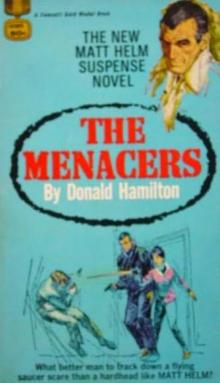 The Menacers mh-11
The Menacers mh-11 The Retaliators
The Retaliators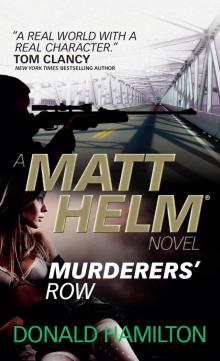 Murderers' Row
Murderers' Row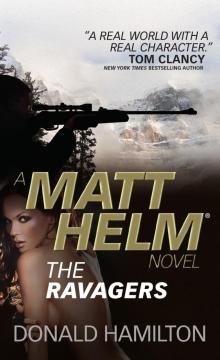 The Ravagers
The Ravagers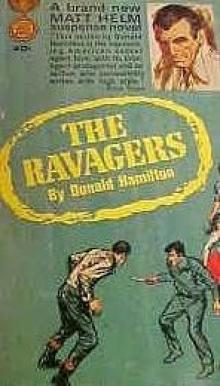 The Ravagers mh-8
The Ravagers mh-8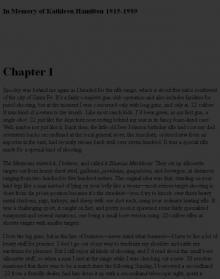 The Threateners
The Threateners The Betrayers mh-10
The Betrayers mh-10